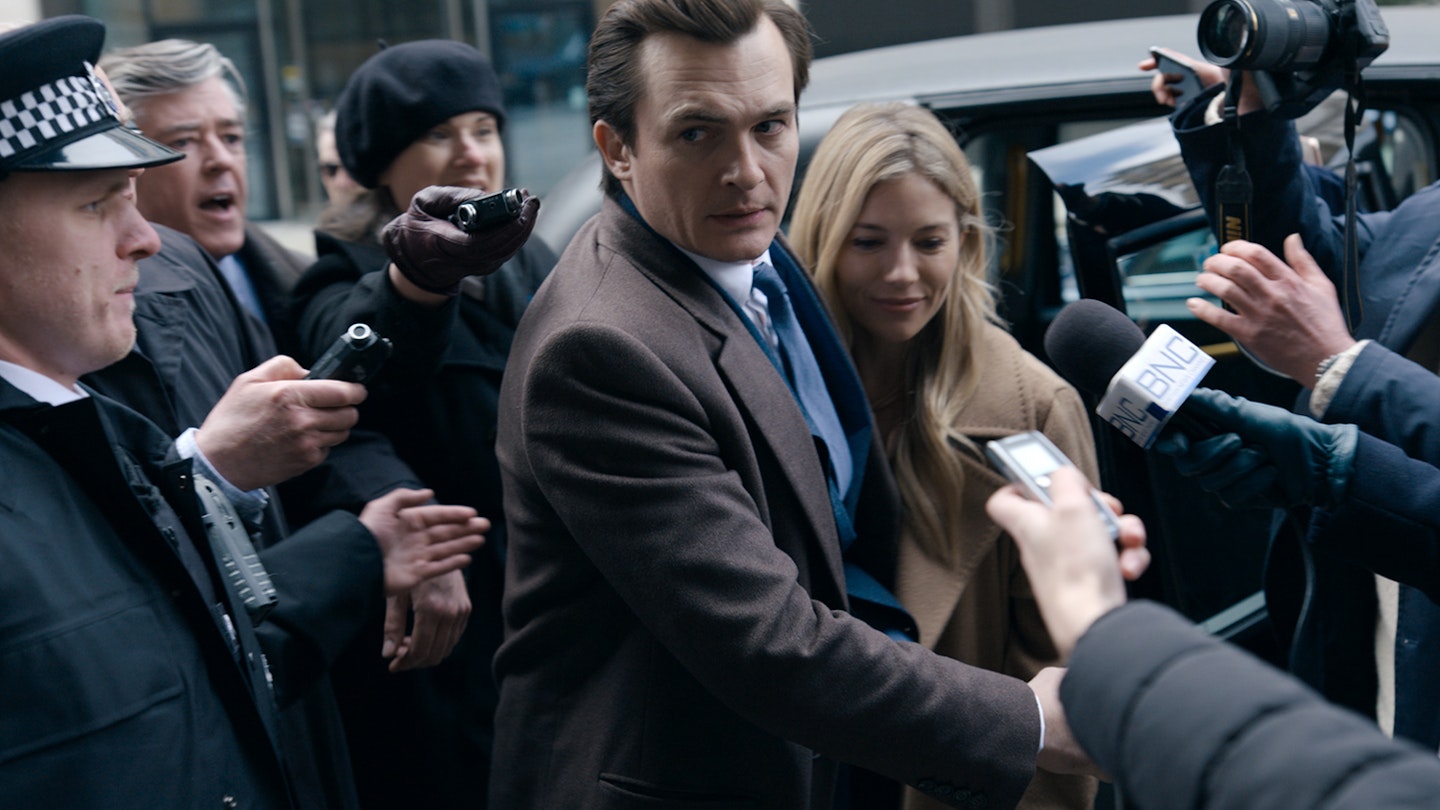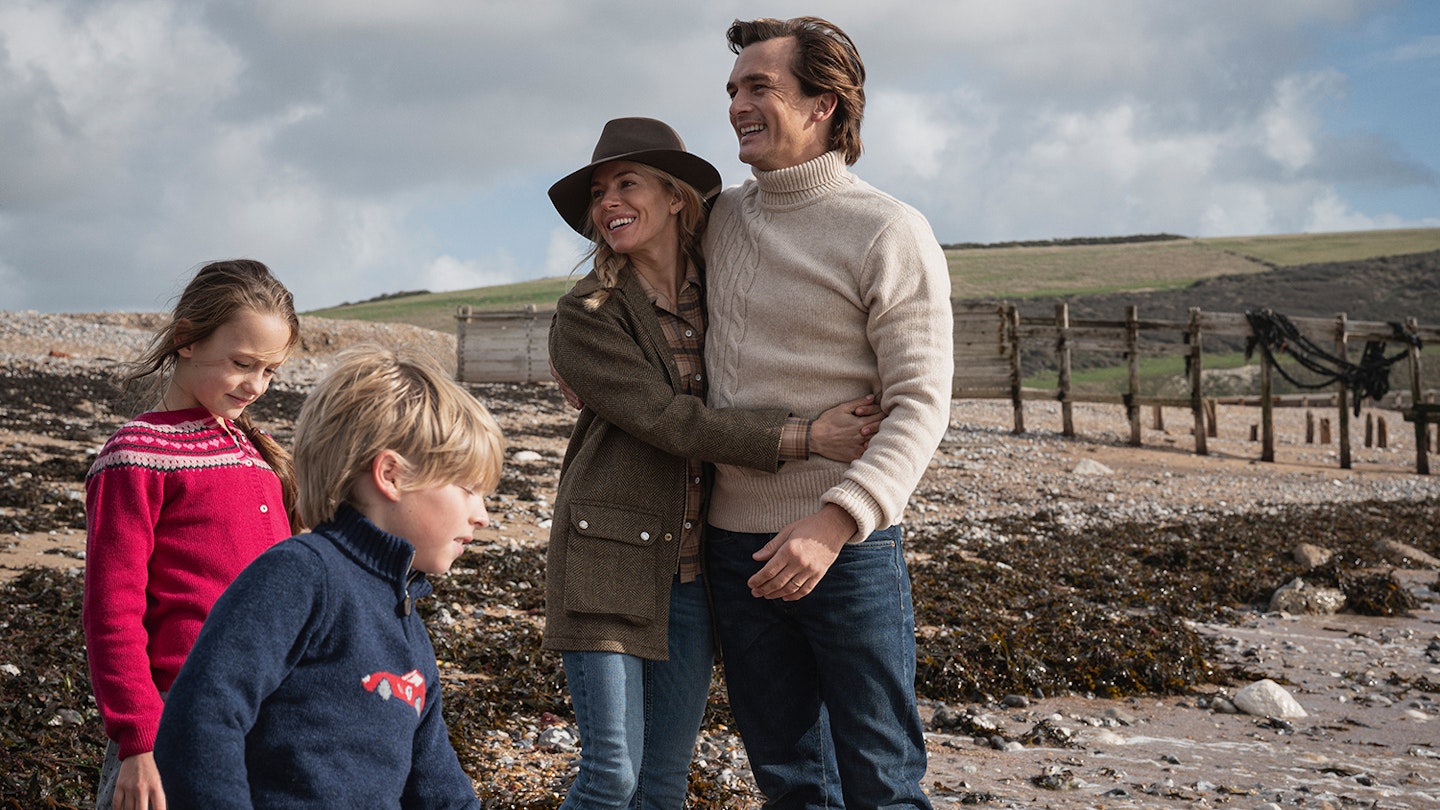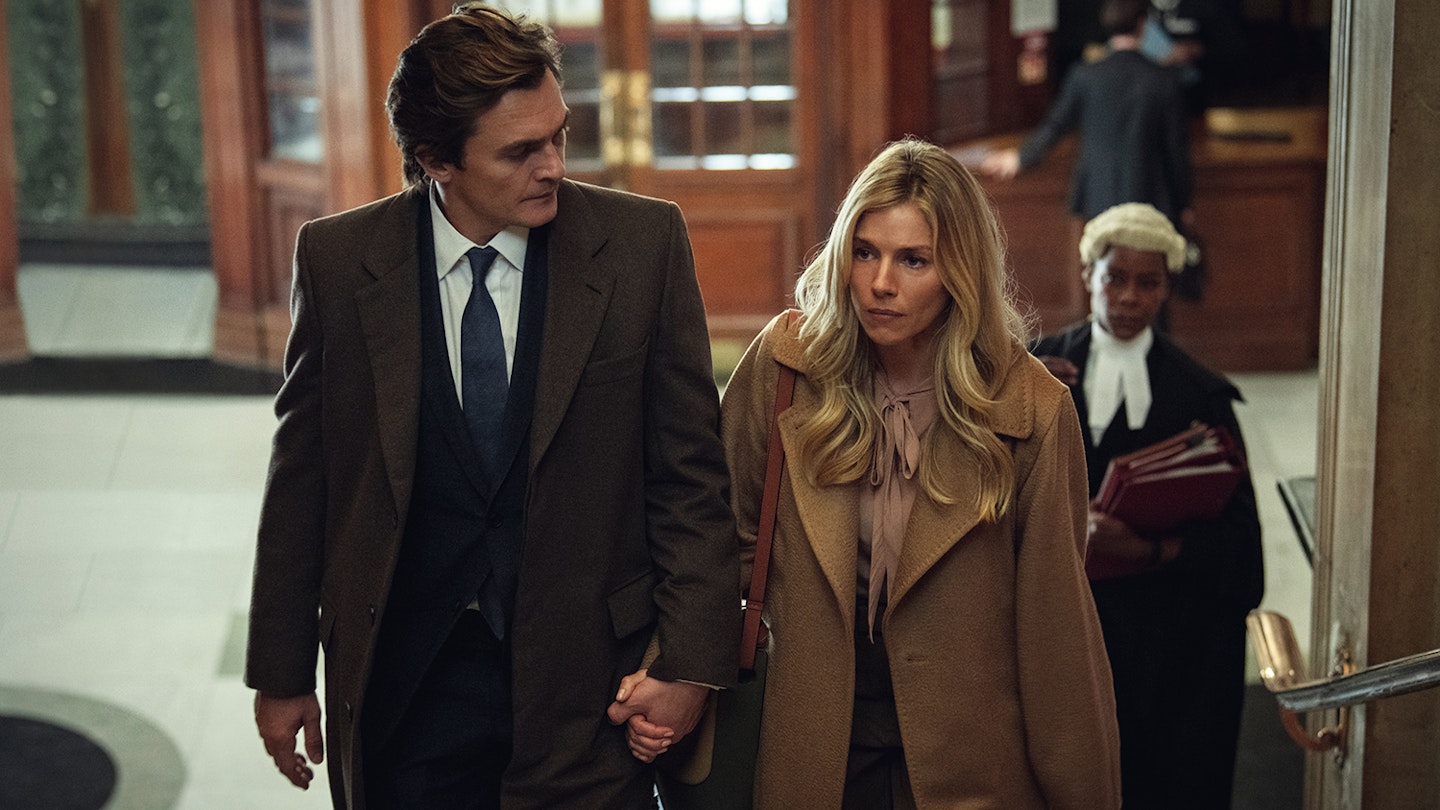From Ally McBeal, to Boston Legal, to Big Little Lies, David E Kelly is an absolute TV powerhouse. And now, he’s teamed up with Melissa James Gibson – a playwright who also penned scripts for The Americans and House Of Cards – and director SJ Clarkson for Netflix’s limited series Anatomy Of A Scandal, a six-part legal drama based on the novel by Sarah Vaughan. At the heart of the show is Sienna Miller’s Sophie Whitehouse, wife of a Conservative MP, James (played by Rupert Friend), who discovers he’s been having an affair with his aide. Shortly after, he’s also accused of rape, kicking off a legal trial that digs up all kinds of secrets.
Miller and Friend stopped by the Pilot TV podcast this week to dig into their love of David E Kelley’s work, their reactions to Anatomy Of A Scandal’s propulsive scripts, and the conversations they hope the series will ignite. Listen to the full interview on the podcast here, or read an edited version below.

PILOT TV: What were your thoughts when you first read the scripts for the show?
Sienna Miller: I got sent a pile of six scripts, which is quite a daunting sight. And of course, the names on the front of it were David E Kelly and Melissa James Gibson, so I was quite excited to have a look. I actually read all of them in one sitting, because they were so propulsive and they had so many twists and turns that I didn't see coming. And I understand, as we all do, that in order to make a good six-part drama, it needs to be compelling in the way that this really was. And it tackles really important and prevalent themes.
You mentioned David E Kelly and Melissa James Gibson. What were your relationships like with their work ahead of starting this project?
SM: Well, I grew up with Ally McBeal, and I loved it.
Rupert Friend: Me too.
SM: Huge Michelle Pfeiffer fan. Then of course, like the rest of the world I binged Big Little Lies and The Undoing. This is his first time working at Netflix, so that felt like a moment. Melissa's obviously added her own brilliant touch as well. House Of Cards, I loved. They're both just really, really high up.
RF: Was I attached when you got the script?
SM: You were not, no. But obviously, as soon as you were-
RF: It got even better.
SM: That's when I started to question whether or not I wanted to be a part of it. [laughing]
Trying to understand the way that he saw the world, rather than the way that we saw him, was key to it. – Rupert Friend
They are two incredibly complicated characters, but you don't see what you get with them for quite a long time. What was your 'in' for playing them both as individuals, and as a couple?
SM: I found it really interesting because Sophie is so specifically that type of woman that I think we've all seen growing up in England. She's incredibly contained. She's very composed. She's very stoic. Quite acerbic, actually the opposite of me, which felt like a real departure. But I was keen to play somebody English. And I thought that that kind of containment was something I hadn't ever explored. I'm always quite emotional and open in the things that I've done in the past. And this felt like a very different type of character. So there was no 'in', really, other than reading the book that Sarah Vaughan had written, that really spent so much time in each character's interior. A lot of the work was done there. We used that as a real Bible, a jumping-off point. And then I look at, you know, Tory wives, and extremely posh, well-bred English women, and take little bits from here and there. There wasn't one specific person I based it on.
Rupert, I imagine it was a very difficult task for you as well. How did you approach this character?
RF: This was a guy who I don't think any of us particularly warm to when you read the script. The scandal of the affair aside, it's a very small echelon of society that has that kind of privilege and power, that elite world in which he moves. So trying to understand the way that he saw the world, rather than the way that we saw him, was key to it for me.
These two characters bring out the worst in each other. What was it like to work through that together?
SM: I mean, fortunately, we really get along extremely well and became very close friends. We were dealing with such intense subject matter every day, and it was a heavy space to sit in. We found our levity quite easily in the middle of these intense takes. But it was hard, and it required trust. It's harder for Sophie's character because the knocks keep coming. There's just shock after shock after shock. We had a fantastic director, SJ Clarkson, who really was navigating and guiding us through all of that mess. And also was very willing to let us laugh, and join in laughing, when we needed to. But there were days of deep intensity, of course there were. And moments where we were pretty quiet, because it was just hard.

SJ’s direction brings such tension. At times it's like watching a horror film, watching these characters' worlds fall apart in front of you.
RF: Well, SJ is brilliant at many things, but one of the things that she really focused on was the way that people remember the same event differently. And so she clearly delineated the fact that this version of events, there is no objective version. There's only multiple subjective versions of it. Which I thought was super interesting, and her techniques with the flashbacks, the way you remember something and you're suddenly there – we all know that expression, 'In my mind's eye, I was back there', we tend to sort of imagine the place very vividly. And I thought she created that visually in a very strong and unique way. And in fact, apparently, David E Kelly, was so impressed, he said, "I'm going to steal from you for the rest of my career." Which, considering he's one of the best legal drama writers going, that's quite a high compliment.
SM: She also added, which I think is so impactful, the kind of metaphor at the end of each episode, which was her idea. So in Episode 1, Rupert's punched and it's a metaphor for how he's feeling, or Sophie's falling through the roof of the Old Bailey. All of those were creative decisions. Her very stylised way of directing elevates this. I think you could have told this story in a simple, linear way, and it would have worked – it was that propulsive. But she made it really deep, I think, and psychological. And she shoots beautifully. I think London looks like a James Bond film, which I'm thrilled about, because it can sometimes look a little bit dreary, and she shoots it really beautifully.
It comes with so many twists and turns. What are some of the reactions that you've had to the show so far?
SM: Bingey.
RF: Binge-a-rama. Everyone's like, "I tried to watch one, and then before I knew it, it was two in the morning and I'd seen all of them."
SM: Which is all you want, really, as a reaction. Neither of us read any reviews. The thing that most people have said is that they couldn't stop watching it, which is what we were all hoping to make.
A couple of people I know are pretty convinced of Rupert's character's innocence. – Sienna Miller
Have you had reactions to your characters, specifically? Have they responded kind of personally to some of the stuff on screen?
SM: What I did find interesting, actually, is that there are a couple of people who have seen it that I know who are pretty convinced of Rupert's character's innocence. And I was shocked by that, because to me it's very clearly not the case. But that made me excited, because you want to make something polarising, that doesn't just spoon feed you facts. Because SJ shows it from so many different angles, I think there are going to be people that I can't really understand, but that who are advocating for a different outcome, and that should incur some really healthy arguments and interior thoughts. Hopefully people will look at the structures of the world that we're living in right now and maybe question them more than they have in the past. We're not trying to change the world. We're actors telling a story that we want to be dramatic and propelling, but it does touch on themes that I think are just so relevant today.
What are you hoping that people will take away from watching this show?
RF: I'd echo what Sienna said. I think it's a conversation starter. I think it'd be great if, within a family there were differing views on the events that go down, however we might feel about it. It's the idea of a way into a conversation that's probably been long overdue.
SM: And I think it also highlights just how difficult it is to prosecute rape. And it's shocking, you know, the statistics are really pretty dismal. And I wonder if that will be something that people think about, which I think they need to. It certainly made me think.
You're both going on to huge things – Sienna, you have Extrapolations, and obviously Rupert, you're off to a galaxy far, far away very soon. What drives you to a small screen project at this stage in in your careers?
SM: I'm just excited to be in things that people want to watch. I've only done one other limited series, The Loudest Voice, and it was really nice to have people come up and say, "I really enjoyed that show". I tend to make really small independent cinema that the seven people that watch might appreciate, but I think I'm just ready to be in things that that people see. And this is how people really watch- you know, the world has changed. Film is somewhat obsolete, unless it's enormous. It's such a gamble. And I personally love a six-part drama. I don't have the patience to sit with a seven year thing. I want to, and I know that they're brilliant, but this suits me, a) as an actor just because I can't commit to anything for seven years, and b) I think it feels in a way like a long film. You get more time to explore things that you don't in cinema. That being said, I still love a movie.
RF: Yeah, I think the lines are blurring increasingly between what constitutes a movie versus a TV show versus a limited [series]. Something like this, that's of this quality, it sort of feels to me like a big bumper long movie. And as Sienna said, It's not the kind of thing where, "We'll be back next year!" It is a contained thing. The quality of the collaborators, I'd rather that that was kept high, rather than it be in a specific medium or another.
Anatomy Of A Scandal is streaming now on Netflix. Listen to the Pilot TV podcast every week for the latest TV reviews, interviews, news.
